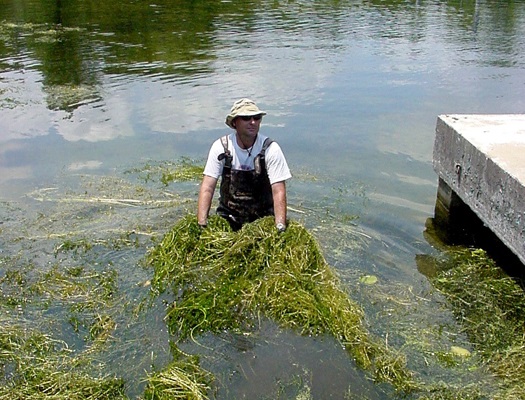Hand Pulling
Considerations
- Labor intensive – may be limited to small areas – (for example, eradicate new invasive plant introduction)
- Immediate control of small populations
- Selective if water is clear and plants are readily distinguishable from intermixed, non-target plants
- Long control duration – especially if roots are completely removed
- Need suitable disposal area – preferably upland site close to control area
- Use where other methods are not feasible or appropriate
- Shallow water where harvesters cannot operate
- Fast flowing waters where herbicide dose cannot be maintained near potable water intakes
- Near endangered species habitat
- Sediment type
- Sediments may silt up control area and make locating plants difficult
- Sand or clay sediments may make complete root removal difficult – quick recovery
- Water depth
- Easier to remove plants in less than 2-3 feet of water
- Deep water may require SCUBA gear
- Water clarity – plants must be easily seen for thorough control
- Plant characteristics
- May not be suitable for plants that fragment easily and whose fragments readily form new roots like hydrilla, Eurasian watermilfoil, or N. cristata
- Difficult for plants with deep (American lotus), extensive (spatterdock), or easily fragmented (torpedograss) rhizomes
Examples of Feasible Control
- Removing cattail or other emersed plants from around swimming areas, boat ramps or docks
- Removing new infestations of invasive plants as part of eradication programs
- Hand pick water hyacinth or water lettuce that drifts onto a shoreline
- Pull emergsed Nymphoides cristata from small patches in lakes
- Divers search for and pull up newly discovered hydrilla around boat ramps
Diver Assisted Dredging – A Variation of Hand Pulling
Facilitates hand pulling of plants especially in deeper water.
Considerations: Similar to Hand Pulling
- Need specialized equipment including:
- SCUBA gear
- Barge and screening system to separate plants from sediments attached to roots
- Pump and airlift / hose system
- Spotter to assist diver safety and fend off boats, alligators, etc.
- Deck attendants to remove dredged plants from screening apparatus
- May cause temporary localized turbidity at control site and in screening area
Examples of Feasible Control
- Deeper water in spring runs where herbicides and harvesting are not an option
- Patrolling small areas to confirm eradication efforts for submersed invasive plants like hydrilla


